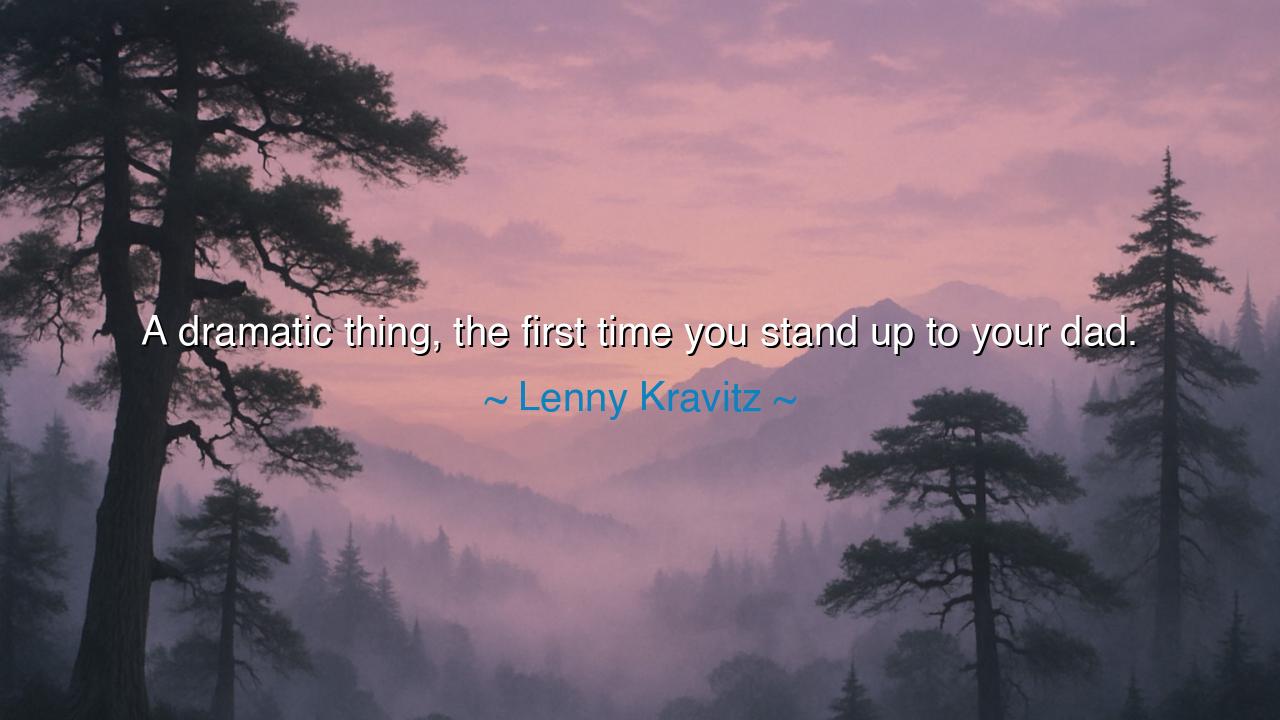
A dramatic thing, the first time you stand up to your dad.






In the solemn honesty of remembrance, Lenny Kravitz once said: “A dramatic thing, the first time you stand up to your dad.” Though the words are few, they carry the weight of a thousand hearts. For every man and woman, no matter their birth or station, must one day cross that invisible threshold — from the child who obeys to the soul who defines itself. To stand up to one’s father is not merely to defy authority; it is to step into the fierce light of selfhood, to claim the right to live according to one’s own truth. It is a moment both dramatic and sacred, for it marks the beginning of independence, the forging of identity, and the recognition that love and disagreement can dwell within the same heart.
To the ancients, this moment was a rite of passage, a trial written into the very order of life. Lenny Kravitz, in speaking of this “dramatic” act, invokes not rebellion for its own sake, but the awakening of maturity. A father, to the young, is a towering figure — part guardian, part god. To challenge him is to tremble before the divine and yet not turn away. The Greeks told of Telemachus, son of Odysseus, who grew in the shadow of a hero. For years, he lived under the weight of absence and legend, until at last, he stood before kings and spoke in his own voice. That was his standing up — not in anger, but in courage. The first act of self-definition. The same fire burns in Kravitz’s words — the recognition that one must face the image of authority in order to see one’s own reflection clearly.
The father, in every age, is the first symbol of the world’s law — the one who teaches boundaries, who says “you may” and “you must not.” But the child, as they grow, begins to sense that truth cannot be inherited whole. There comes a day when obedience alone becomes too small for the spirit. To stand up does not mean to destroy what the father has given, but to build upon it. It is the moment when respect ceases to be fear, and love becomes equal. The drama Kravitz speaks of is not the storm between enemies, but the thunder within — the struggle between gratitude and self-determination, between reverence for the father and the need to become one’s own.
It is no small thing to confront the one who gave you life. For in that moment, both father and child are tested. The father must release control; the child must bear responsibility. Consider the story of King Lear, who demanded obedience from his daughters, yet could not bear the truth when his youngest, Cordelia, refused to flatter him. Her quiet defiance, born from honesty, led to tragedy — not because she was wrong, but because the father could not yet see that love sometimes speaks through disagreement. Kravitz’s words, in their modern simplicity, carry this ancient lesson: that standing up to one’s father is not betrayal, but the painful birth of authenticity.
For Lenny Kravitz, himself a son of a musician and filmmaker, this moment likely came amid both love and conflict — a meeting of two powerful spirits bound by blood and ambition. His father’s expectations, his own dreams, the invisible inheritance of pride and discipline — all these formed the battleground of growth. To stand up to such a figure is indeed dramatic, for it is not only an act of courage, but a declaration that one’s soul is ready to bear the weight of freedom. Many never face that moment; they remain forever children, living beneath the shadow of another’s will. But those who do — those who stand — begin to live by their own light.
The lesson is timeless: respect and courage must coexist. To honor your father does not mean to agree with him always. To follow your path does not mean to forget who showed you the first steps. True strength is born when love and independence walk side by side. The child who never questions becomes dependent; the one who only defies becomes lost. The balance lies in standing tall — in saying, “I am grateful for what you gave me, but I must now find my own way.” This is the sacred conversation between generations, the fire that keeps wisdom alive.
Let this teaching be remembered by all who come of age: to stand up to your father is not to reject him, but to meet him as an equal in truth. It is to transform reverence into respect, dependence into partnership, fear into understanding. And in this transformation lies the quiet heroism of maturity. For when a son or daughter can look into their father’s eyes — no longer as a child trembling before judgment, but as a soul walking beside him — then both are made whole.
Thus, the teaching concludes: the first time you stand up to your father is indeed dramatic, for it is the dawn of your own becoming. It is the moment when love grows large enough to hold truth, and courage learns to bow without breaking. Remember it, honor it, and walk forward with compassion — for one day, you too will stand as a parent, and feel that same mix of pride and ache when your own child stands up to you, carrying your light into the world, yet shining with a fire entirely their own.






AAdministratorAdministrator
Welcome, honored guests. Please leave a comment, we will respond soon